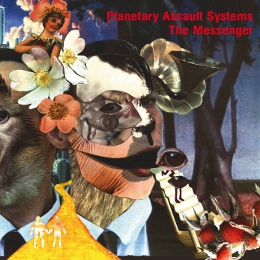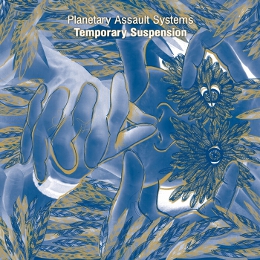Luke Slater: Return to Planet Techno

Luke Slater is a techno survivor, one of the few UK producers to emerge during the early 90s whose contemporary output sounds relevant. While his back catalogue boasts music as diverse as the windswept ambience of 7th Plain, through the nosebleed severity of his X-Tront releases and the widescreen techno of his Morganistic project alongside his more recent dubby outings as LB Dub Corp, it’s Slater’s Planetary Assault Systems project where his creative genius is most pronounced.
There is no question that Planetary releases like “Booster” and “In From the Night”, though close to 20 years old, are so timeless they can still reduce a crowd to a slobbering mass and even send a shiver down the most cynical techno fan’s spine. The latter track, dropped midway through a live Planetary show in Dublin recently, reminded this writer – and the rest of those in attendance as 400 fists pumped the air – that when it comes to dynamic, futuristic techno, Slater remains peerless.
However such talent often comes at a price and the UK producer’s re-emergence in 2009 with the Temporary Suspension album heralded the end of a creatively fallow period.
“Since I did Temporary Suspension, I have been writing quite a lot. That album started me back up in a way,” Luke explains when I speak to him by phone a few weeks prior to the Dublin gig.
“I’m pretty much an on-off kind of person – if I don’t want to do something, I just can’t do it. I’m an extremist; I just don’t do the comfortable bit in the middle, which is a bit of a bummer really because it’s nice and cosy there.”
On his return, the challenge for Slater was twofold; firstly, techno had undergone radical change during his absence – with the loop techno cycle supplanted by the mnml explosion, which in turn was overtaken by a return to classic sounds and hand-stamped anonymity – and he would have to redefine himself within this new landscape. Secondly, there was a danger that he would merely replicate the music that he had made his name with – and it is doubtful that even his most ardent fans needed to hear “Booster” Mark 2.
“When I did Temporary and now The Messenger, I thought to myself, ‘I’m going to do this in a different way, in a different light’. That’s the way I approached it and I really liked it. Sure, I had to be careful, but I felt that I had the right music to come back with,” he believes.
“I wanted to see how people took to Temporary Suspension because I saw the 90s as a different lifetime. In some ways you could see it as a complete head fuck. I thought to myself, if I start doing it, I have to find something new and exciting. Even in the real world, you have to experience new things so as not to get bored.”
The fact that Temporary Suspension was released on Ostgut Ton made perfect sense. After all, here was the label arm of the Berlin club credited with revitalising classic techno sounds putting out an album by one of its guiding lights. This narrative was also audible on the music, with Slater’s lithe yet merciless metallic rhythms referencing dense Klock-isms and glitchy Dettmann-like industrial nuances, which in turn had been heavily influenced by the 90s output of Mills, Downwards, Tresor, Cosmic/Lost and of course Slater himself.
Temporary Suspension may have been the most articulate reflection of a reflection to emerge from the techno canon, but it was also concrete recognition of Slater’s affiliation to the Berghain club.
“The number of years I have been playing there, no question about it, it always felt like a place that was very understated but which has a huge impact. It doesn’t blow its own trumpet, despite all the hype it gets,” he believes. “There is a huge difference in playing Berghain and playing a festival where it all goes off in a tent. But when it comes to feeling at home, it is the place that I feel really close to.
“The guys who play there have been into techno for years. I have always tried to keep my head down and get on with it, try not to sell techno so much. You can dress it up and give it an image, but people will find their own way to it if they are interested,” Luke says of the club’s refusal to court publicity or cater to more mainstream sounds.
But if Berghain champions classic styles, surely Slater feels like history is repeating itself whenever he performs there – and anyway, wasn’t techno better the first time round?
“The 90s were crazy, you didn’t have time to think about what was going on,” Luke says, lending credence to the age-old maxim that a musical movement could only be significant if its participants didn’t remember much about it afterwards. “It just happened so quickly. Now I hope, I am older and wiser – well, you can’t help being older – and think more about what’s going on.
“Looking back on a time and seeing it as being perfect is a dangerous thing and anyway, it’s just not true. It’s great the way that people feel about the past, but in reality it wasn’t like that – it was so much and it happened so fast that there were so many questions left unanswered,” he adds.

It’s refreshing to hear someone like Slater, who rose to prominence during the 90s, deviate from the widely-held perception that the decade was a golden period dominated by groundbreaking electronic music. Or as Luke states baldly: “I still have racks and racks of crap promos from the 90s.”
Yet if the 90s are held up as the watermark for innovation, then what does that say about the contemporary music that wears those influences so clearly? Once again, Slater’s view differs from the accepted wisdom.
“Nowadays the music is so important,” he maintains. “In the new generation, there are people who picked up on the good stuff that has been around for years and yes, a lot of the classic sounds have come back, but in a good way. I suppose I am responsible for part of this, but maybe just call it the coming together of different energy, coming together at different times.”
Given that much of the current wave of techno has traces of Slater’s creative footprint, his positive assessment of it could be seen as self-serving. On one hand, he says, “people are so much more clued up now and they are feeling all the good stuff”, but equally, he is quick to point out modern-day shortfalls.
“The one thing I can honestly say that I miss from the 90s is the physical touch of vinyl. I am 100 per cent behind technology, but there is still a beauty about music being pressed onto a physical medium. I still buy a lot of vinyl, but I record it and play off CDJs,” he explains.
It’s not just an aesthetic concern: when Slater started releasing music, it was not unusual for big techno releases to sell 20,000 units and for producers to earn a good living on the back of such records. Nowadays, vinyl releases have gone from being a DJs’s livelihood to becoming their high-end business card to secure gigs.
“I don’t think that it has a future in the same way,” Luke says about vinyl. “Back in the day it was just the way that music was released. It’s mad the way that vinyl is looked at nowadays of being so specialist. There are so many options now and buying vinyl is a luxury, like being able to afford to buy a beautiful pair of trainers.”
Despite this, Slater’s own label puts an emphasis on releasing vinyl – but he also stresses that Mote Evolver is a labour of love rather than a cash cow.
“I started the label to do it as an experiment for my own stuff. There’s not much money to be made in running a label, so it has to make complete sense from an artistic perspective, it has to be as good as anything else out there.”
However, rather than knocking out countless EPs as a profile-building exercise, like the best labels Mote Evolver puts out 12”s at a composed pace.
“My thinking about music making, my frame of mind, felt that it wasn’t just about releasing dance 12”s, it was ‘let’s make a great record’,” Luke explains. “A lot of artists got in touch, wanted to release music, there are a lot of producers I want to do stuff with, but the schedule is so far ahead. It’s been a learning process, but hopefully whatever we put out is quality.”
In the meantime, Ostgut has just put out Slater’s latest Planetary Assault Systems album, The Messenger. More atmospheric and eerie than Temporary Suspension, it isn’t short of jaw-grindingly intense peak-time club techno – as anyone who has heard the oppressive, juggernaut bass and solder-iron riffs of “Rip The Cut” will attest – but it also sees Luke explore a less upfront and ultimately more rewarding vein.
From the chiming, gamelan-like hypnotic bells of “Bell Blocker’, through the droning grooves of “Call From The East” and “Wriss” through the chilling, spooky dub of “Beauty In The Fear”, it sounds more personal, almost uncomfortably so.
“I had to find a way to release music and find something that is important to me. I had to try to put in things, my way of looking at it, without losing the club side of it and to remain valid within the dance scene,” he explains. “I have always tried to put my stamp on it; I didn’t want to lose my story. For the new album, I looked back to The Drone Sector [Planetary Assault System’s second 1997 album] for inspiration. I love that LP and I feel that it gets overlooked. Maybe older people like it, but I get quite inspired by one of my own albums, it almost felt as if I hadn’t written it. “
So while Temporary Suspension provided Slater’s interpretation of how others interpreted his back catalogue, he feels that Messenger is his own attempt to re-imagine sections of his own discography.
This explains the inclusion of ambient soundscape “The Railer (Further Exploration)” and the angular electronica of “Movement 12”, which could have come from his My Wise Yellow Rug and Drone Sector albums or the austere bleep techno of “Cold Bolster”, which could have been derived from his “Planetary Funk” EPs.
If this sense of re-opening old narratives is audible on the album itself, the sense of identity confusion spills onto the album artwork with Slater himself portrayed in collage form on the cover, like a still from a Monty Python sketch done in a Dali style.
“Yeah, that’s me on the cover,” Luke laughs, explaining that “a guy called Viron, who also did the art for Temporary Suspension, did the cover art. He really lives his art. I played him some of the demos, he came up with the art and I was blown away. He is a really talented guy. I have always been into surreal art and I’m a big Terry Gilliam fan. Having a physical product these days is such an important thing, it makes so much sense,” he adds.
The combination of deep, probing rhythms, arrangements like “Wriss”, where a breathy vocal appears fleetingly, or “Beauty In The Fear”, an autobiographical look at the underbelly of the human psyche – more about that later – with the surrealist cover makes the album Slater’s most personal Planetary outing, as if a port has slid open on the steel space machine, Wizard Of Oz-like, to reveal its human driver.
“Temporary Suspension is straight to the point; with The Messenger I wanted to go deeper. I wanted to tackle the areas that I felt were important to me,” Luke feels. “Even with the records I buy, I like to get ones that aren’t straight. It has happened a lot in the studio that I have written tracks but then binned them because they were too straight, because they sounded like someone else could have written them.”


To an extent this has always been the way with Planetary releases. Listen to “Booster”, “In From the Night” and “Gated” or even later tracks like “Gruv” and it is obvious from the first few bars that they were idiosyncratic – different from each other as well as different from every other techno release. Slater believes that the obscurity Planetary enjoyed during the 90s allowed him the freedom to experiment.
“That’s the way it worked back when I started Planetary, because it wasn’t as noticed then as it is now,” he explains. “In a sense, the idea of people being famous for fame’s sake is something that started in the 90s but in my own case, I was just writing and releasing music because I loved it, and suddenly everything exploded for me. I couldn’t live with the idea of being famous just for the sake of it.
“This is something the younger guys need to realise. They think that they will put out a record and will get famous, but that’s not going to happen. I get the sense now that the focus is much more on the music.”
But given that he is much better known now does that mean there are even greater expectations on Planetary to deliver something no one else has done before?
“It carries more weight now, but I also carry the weight of my history and I have to acknowledge it. I don’t want to say that it is a new act, but equally I would get bored playing all the same tracks again. Planetary nowadays is a very different thing. There is a new generation out there and yeah, I want them to dive back into techno’s history and even find out what the ideas are behind what a techno night can be. But having said that, I don’t really care if they don’t know all the old classics if they can turn up and enjoy the music I’m making now – and I am sure there a lot of kids who come to the shows who don’t know about the old Planetary music,” he says.
Talk of techno’s history throws up a common theme among DJs and producers who have been around for a while – the generation gap. While Slater would have performed to his peers during the 90s, the difference in age between him and the crowd he now plays has increased. As he approaches middle age, how does he feel about playing every weekend to an audience much younger than him?
“The funny thing is, I was playing at FUSE in Brussels recently at a Time To Express party,” Luke answers by way of anecdote. “I hadn’t been there in years and as I peered out into the crowd it looked like no one had aged! I said to myself, ‘I am 10 years older and you guys haven’t aged at all – the last 10 years haven’t happened to you, only to me!’ But I kinda like it. I think it would make a difference if you were flogging a dead horse, something old and battered, but I feel I have something new to say and I would never do a greatest hits show.”
A cynic could argue that there is no need for a veteran techno producer to re-ignite their back catalogue because there are so many new school artists making music that is heavily indebted to older styles. As one of the driving forces of 90s techno, how does Slater feel about this trend?
“I hear a lot of tracks that are real replicas of the 90s; they want to recreate that dirty sound and that’s fine, but the truth is that back then, that was the only sound we could get, and it’s not what I want to do any more,” he says. “It’s like records from the 70s; they sound shit, but the music is so real and true, you can smell the genius, it flows from them.”
On the subject of real life and truth, it sounds like there is at least one autobiographical moment on the new album – “Beauty In The Fear”. During the time when he took a break from making techno, Luke underwent some turmoil in his personal life, which he says “changed me as a person – it really opened my eyes”. He readily admits that the music-making process offers a form of catharsis and that when he produces, he “always feels like I am giving part of myself away”. However, when he made “Beauty In The Fear”, the reaction it elicited was more extreme than usual.
“It scared the shit out of me, I felt the hairs standing on the back of my neck,” he says, adding: “it really affected me. I thought people might kill themselves if they heard it. I love the darkness, it can be a very powerful thing, but it needs to be treated carefully. It’s always nice to see the holes and realness in people; maybe if we could look more at that side of humanity, music would sound different.”
Luke’s retreat from techno and upheaval in his personal life happened after the release of Alright On Top, the 2002 pop-dance album that he released under his own name. While it succeeded in alienating his techno following and baffling critics, it was the logical outcome from Slater’s growing disenchantment with electronic music and he believes was something that he needed to do.
“We had a long, long chat about it. At the time, Peacefrog thought it was inevitable [the album was released on Mute – Ed] but I don’t regret making it. I had to make it, find a way out, to find a new feeling. I didn’t want to sustain Planetary Assault Systems, I didn’t want to play techno, I didn’t regret it at all. I never wanted to do anything else like that again. I didn’t want to listen to music anymore.”
But the release of Alright, followed by a few years’ absence from techno music proved to be exactly the answer to Luke’s sense of fatigue. He admits that he did a lot of soul-searching over the years, but now feels emboldened and ready to give electronic music his all once again.
“What is the point in doing something if you’re not really into it,” he asks before answering himself. “It doesn’t matter what hardships you have in your own life, you really have to roll with this lifestyle – and I know that I have the energy again to do this.”
Take one listen to The Messenger and it’s hard not to agree.
Richard Brophy